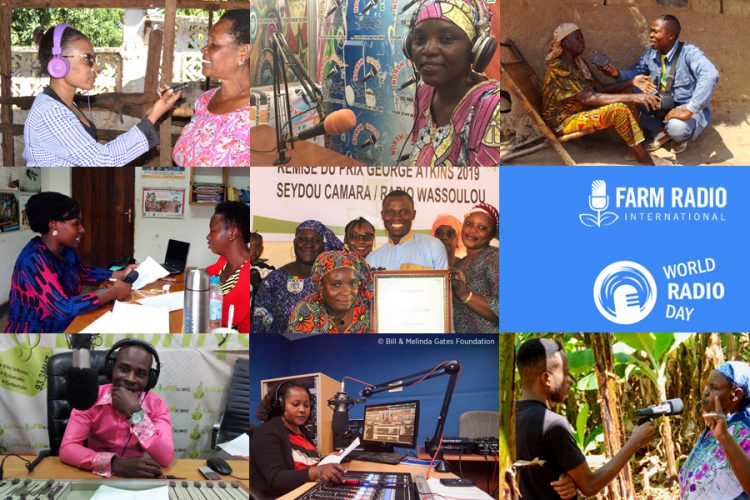Each year, we celebrate World Radio Day and the important role that radio plays in our lives and the lives of the communities we serve. Radio communicates important information, provides entertainment, shares stories and people’s opinions, and starts conversations 一 on air and off.
The theme of World Radio Day this year is diversity, celebrating pluralism in radio, representation in the newsroom, and diversity of content and program types shared on air.
Farm Radio International is proud of our incredibly diverse network of 965 radio stations in 41 countries.
This network includes 115 partners in Uganda. One of them is Voice of Kigezi, which broadcasts to a rural audience in southwestern Uganda. When the broadcasters plan their farmer program, “B’Omugaiga,” they have a particular listener in mind: a young, semi-literate woman with a family to take care of. She is a farmer, growing crops to feed her family, and dreams of expanding her production or adding value to her harvest to earn more money. This program won the inaugural Liz Hughes Award for Her Farm Radio in 2019.
Our partner in Cameroon, Radio Taboo, serves indigenous Tikar and Bedzan (pygmy) villages, operating with the motto “The Voice for the Voiceless.” People in the Tikar Plain region speak 20 different languages. Radio Taboo broadcasts in 10 languages to meet the needs of as many listeners as possible. These include French, English, Tikar, Balon, Bamoun, Djanti, Hausa, Bavek, Fulani, and Babouté (also known as N’vouté). Many listeners live in isolated indigenous villages, where there are few outside sources of information.
We have 129 partners in Ghana, including Lorlornyo FM in the Volta Region of Ghana. Broadcaster Benjamin Homadzi loves interacting with his listeners during the phone-in and phone-out segments of the program and, though he is not a farmer himself, says he has learned a lot from speaking to farmers and resource persons over the years.
Our radio network also includes 93 partners in Mali. Among them is Radio Wassoulou in Yanfolila. Seydou Camara uses field interviews, debates, and call-in segments on his farmer program to raise the voices of farmers. He was a winner of the George Atkins Communications Award in 2019.
Who are our broadcasting partners? These are radio stations or organizations who work with radio to share important information with farmers and rural communities so that they can improve their lives and livelihoods. Our network includes more than 400 community radio stations, but also more than 200 private stations and 87 public broadcasters.
Nearly 3,000 individual radio broadcasters, presenters, hosts, and journalists receive our radio resources to help them produce interesting and informative radio programs. This includes radio scripts and news stories on a wide variety of topics such as production and post-harvest practices, climate change adaptation, health, nutrition, gender and social issues, and more.
We know that our broadcasting partners speak and broadcast in dozens of local languages, like Mooré, Wolof, Amharic, Twi, and more. We encourage our broadcasting partners to translate our resources into their language of broadcast so that they can use them on air, because we know that it is best to broadcast in the languages understood by local audiences.
We also encourage broadcast teams to engage their audiences in every stage of the production process to make it as participatory as possible. This involves understanding their audience’s needs, consulting them on program topics, capturing and airing listeners’ voices on air, and collecting feedback on the radio program. These topics will be covered in our Farmer program e-course, starting in March. But for more information, take a look at our Broadcaster how-to guides:
- VOICE Standards to improve your farmer program
- How to gather regular feedback from your audience
- How to use vox pops in your farm radio program
- Tips for addressing gender equality in your radio program
- How to understand your audience’s needs
We have many more Broadcaster how-to guides about different formats that make for interesting and informative radio programming, including panel discussions, public games, and radio quizzes.
We hope you join us in celebrating World Radio Day by sharing what radio means to you! Connect with us on social media.
Farm Radio International works in partnership with hundreds of radio stations across 40 sub-Saharan African countries and has offices in Burkina Faso, Ethiopia, Ghana, Kenya, Mali, Nigeria, Senegal, Tanzania, and Uganda. We also work closely with our strategic partner Farm Radio Trust in Malawi. Together, we reach tens of millions of rural Africans with life-changing information and opportunities to have a stronger voice in their own development.

